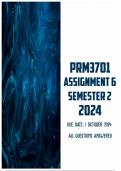, PLEASE USE THIS DOCUMENT AS A GUIDE TO ANSWER YOUR ASSIGNMENT
Please note that the author of this document will not responsibility for any plagiarizing you
commit.
Question 1
1. You have been invited to deliver a speech to young graduates about important issues in
project management. To educate them properly answer the questions that follow.
1.1. Discuss five constraints, besides a project budget, that a project manager must balance to
successfully complete a project.
Project management involves the careful planning, coordination, and execution of a wide variety of
tasks to meet specified objectives. While the project budget is one critical aspect, a project manager
must also balance several other constraints to ensure successful project completion. These constraints
form part of the project management framework and are crucial in determining the project's success.
Each constraint impacts the others, and a delicate balance between them is essential for delivering
the project on time, within scope, and at the desired quality.
Here are five key constraints that project managers need to consider besides the project
budget:
Time - Time is a vital constraint in project management. Every project has a deadline or a
schedule by which specific tasks must be completed. The project manager needs to plan
activities, assign resources, and ensure that each phase of the project is completed according to
the timeline. Delays in one part of the project can create a cascading effect on subsequent tasks,
leading to missed deadlines and potentially higher costs. Time management involves setting
milestones, adjusting schedules as necessary, and monitoring progress to ensure the project
remains on track.
Scope - The scope defines the boundaries of a project, outlining what is included and excluded
in the project's deliverables. Scope creep, which refers to uncontrolled changes or continuous
growth in a project’s scope, can significantly disrupt the balance of a project by requiring
additional resources or extending the timeline. Project managers must manage stakeholder
expectations and ensure that the project remains aligned with the agreed-upon scope. This
involves constant communication and control mechanisms to prevent deviation from the initial
project goals.
Quality - Quality is an often overlooked but critical constraint. It represents the standards or
criteria that the project’s deliverables must meet. While trying to save time or reduce costs,
maintaining the quality of output is essential to meet client or stakeholder expectations. Project
managers must ensure that all work adheres to the agreed-upon specifications and quality
standards. Quality control processes, regular inspections, and tests should be embedded
throughout the project life cycle to monitor and enforce the required quality levels.
Resources - Resource management encompasses the effective allocation of human resources,
equipment, and materials necessary to complete the project. Insufficient or misallocated
resources can cause delays, reduce productivity, or lead to project failure. The project manager
must ensure that the right people with the necessary skills are available and that the required





